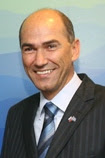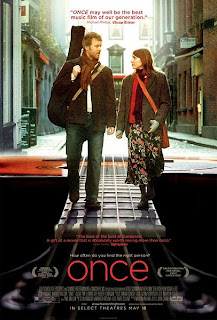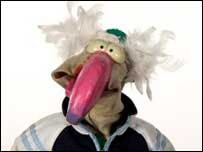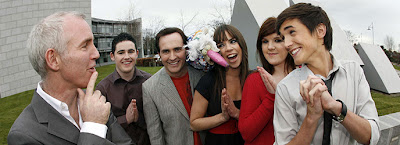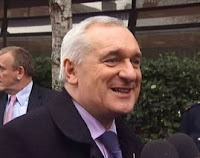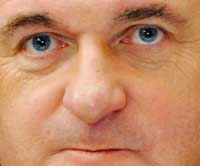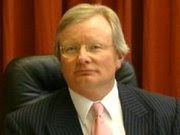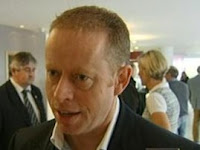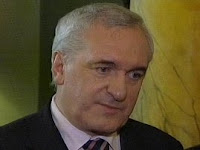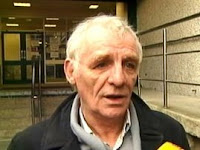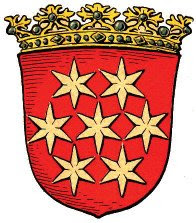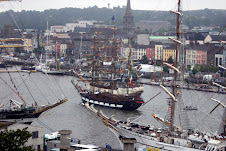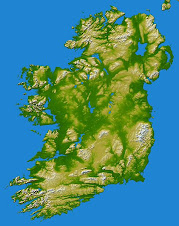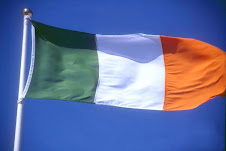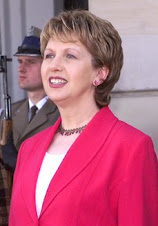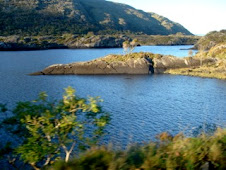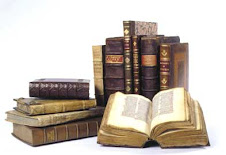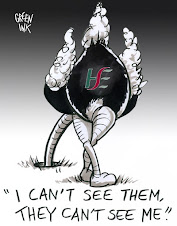For nearly four months the massive and inflexible "mountain" which is the
FAI (Football Association of Ireland) has been moved and moved around, again and again, in search of a new Football manager for the Republic of Ireland.
A three-man committee was appointed to find a suitable replacement for the well-qualified and experienced, but luckless
Steve Staunton (who was and still remains the Republic's most capped player), who had been sacked by the
FAI in a very unceremonious and rather unfair manner on October 23rd, 2007.
The search for a new Ireland manager went on and on, with various names emerging, only to be dropped again faster than a hot potato. Some experienced coaches from abroad, who applied for the job or at least expressed interest, were snubbed by the
FAI or simply ignored, while well-known managers from around the British Isles stated openly that they wished "not to be considered" for the position. This led to the clear perception that it is not very popular within the Football world to be manager of the Republic of Ireland.
Other potential candidates, who did show an initial interest - like former England manager (and recently their assistant manager)
Terry Venables and the experienced veteran
Sam Allardyce, who last managed
Newcastle United and before that
Bolton Wanderers,
Notts County,
Blackpool and (in the 1991-92 season) Limerick - were held in suspension for some weeks until they lost interest as well.
Even for outsiders of the intricate world of Soccer the whole process did look more and more like a big muddle, a charade conducted by hapless elderly pundits who might well be good enough to moan and mutter over all aspects of the game - and to analyse every match and criticise every player for hours on television - but who certainly were not able and qualified to find and select a top grade professional as the new manager of the Republic of Ireland team.
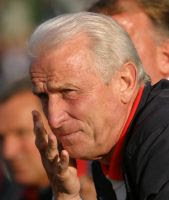
To everyone's surprise the "mountain" has stopped moving today - and given birth to a mouse.
This is the only metaphor that comes to my mind, after I heard that the
FAI has officially agreed a contract with
Giovanni Trapattoni (photo) to become the next manager of Ireland's national Soccer team.
Giovanni who? - you might ask, as I did myself earlier. Well, let me enlighten you a little, since I have just finished my research.
Born on March 17th, 1939 - barely six months before the outbreak of World War II - in Cusano Milanino, a town in the northern Italian province of Milan,
Giovanni Trapattoni began playing Football as a boy and - aged 20 - became a professional player with the famous Italian club AC Milan, primarily as a defender and defensive midfielder. However, in his twelve seasons with
AC Milan Trapattoni played in only 274 games (an average of 22.8 per season) and scored just 3 goals, as he was prone to injuries and had therefore longs spells of absence from the team. After taking a break from the Italian giants, he thought he could settle with the mid-table team of
Varese for one last season instead of playing for one club all his life. Having appeared for
Varese in ten matches during the 1971-72 season, he retired from professional Football aged 33.
Two years later
Trapattoni returned to
AC Milan as a youth coach. After a period as caretaker (in 1974) he managed their first team briefly in 1976, but left the club at the end of the season. He joined
Juventus Turin and was their manager from 1976 to 1986. This decade was the most successful in his career, as he lead the club to six wins of Italy's top league
Seria A and two wins of the
Coppa Italia. There was also international success for
Juventus in this period: in 1977 they won the
UEFA Cup, in 1984 the
Cup Winner's Cup and
European Super Cup, and in 1985 they added the
European Cup and the
Intercontinental Cup to their silverware.
After a decade in Turin, Giovanni returned home to Milan and managed for the next five seasons the city's second top club,
Internazionale (better known as
Inter Milan). In 1991 he was back at
Juventus, but failed to win
Seria A in three seasons. The only significant achievement in those three years was another win of the
UEFA Cup in 1993 and it looked as if Trapattoni was out of luck or had at least passed his prime.
Meanwhile aged 55, Giovanni was appointed by his friend, the great
Franz Beckenbauer, to manage Germany's top club
FC Bayern München in 1994, when the "Kaiser" was elevated from manager to club president.
But it was a poor season for Munich and Trapattoni did not meet Beckenbauer's expectations. During this time
Bayern players frequently appeared on the gossip pages of the newspapers rather than on the sports pages, resulting in the sarcastic nickname "FC Hollywood". Trapattoni left at the end of the season and took - for just one year - charge of the Sardinian club
Cagliari Calcio, then struggling and fighting against relegation in
Seria A, while Beckenbauer returned to manage
Bayern as coach-president, winning the 1996
UEFA Cup.
But the pressure of holding the two top jobs at his club was taking its toll even on "Kaiser Franz". So his friend Giovanni - having saved
Cagliari from relegation - got a second chance with
Bayern München. This time he stayed for two seasons (1996-98), but once again it was a difficult time for both the club and its manager. Despite having a strong and highly paid team, Trapattoni did not cover himself in glory. In fact, the only thing he is still remembered for in Munich are his emotional verbal outburst in broken German, which made him a laughing stock with the media.
The next two seasons he was back home in Italy, managing
ACF Fiorentina, the leading club of Florence, which had just won the
Coppa Italia. But the best Trapattoni could do for his new team was to secure them a place in the
UEFA Champions League.
However, being available (and having the right friends) the 61-year-old
Giovanni Trapattoni was appointed manager of the Italian national team after
Dino Zoff resigned in July 2000. He took the "Azzurri" to the 2002 FIFA World Cup, but once again failed to impress. After winning the first match against Ecuador, Italy's form dropped and they lost against Croatia and almost lost against Mexico (but were eventually saved by an equaliser from substitute Del Piero that secured a draw and Italy's advance into the second round). There Italy were expected to shine, but they were defeated by South Korea, in one of the biggest upsets in the long history of the World Cup.
Surprisingly,
Trapattoni kept his job and led Italy to another disappointing performance in the European Championship of 2004, from which the "Azzurri" returned home early after two first-round draws against Denmark and Sweden. This time Trapattoni had to pay the price for failure and was quickly replaced by
Marcello Lippi.
Now 65,
Giovanni Trapattoni could have retired, as most people do when reaching this age. But instead he returned to international club Football and took charge of
Sport Lisboa e Benfica (better known as
Benfica Lisbon), a famous old sports club in Portugal, leading them to win the Portuguese league for the first time in eleven years. But this, it seems, was the old lion's last roar. After losing the Portuguese cup final to
Vitória de Setúbal he resigned after only one season with
Benfica, saying he wanted to be closer to his family (in the north of Italy).
However, at the start of the next season Trapattoni was in Germany, as manager of
Bundesliga club
VfB Stuttgart, with much hype over his appointment. But once again Giovanni disappointed his employers as well as players and fans. During his 20 games at the helm, the club showed very poor form, with 12 draws, many of them goalless. Eventually two Danish international forwards, playing for Stuttgart, openly criticised their coach, claiming he was "afraid to attack". Trapattoni responded by putting both on the bench, but was fired himself the very next day for "not fulfilling the ambitions of the club".
This should have been the end of his career. Nevertheless, in May 2006
FC Red Bull Salzburg, one of ten clubs in the rather insignificant Austrian federal league, announced it had signed
Giovanni Trapattoni as Director of Football, along with the former player
Lothar Matthäus as coach. Trapattoni initially cast doubt on this report, claiming he had not agreed to any contract. But three days later, both he and Matthäus signed. After their successful season of 2006/07 the club's directors decided to dismiss Matthäus, leaving Trapattoni in sole charge. Since then
FC Red Bull Salzburg were beaten by Ukrainian club
Shakhtar Donetsk in the third qualifying round of the
UEFA Champions League and then knocked out of the
UEFA Cup in the first round by
AEK Athens FC.
Now the
FAI have chosen the 68-year-old Trapattoni (who will be 69 by the time he takes up his new job) as the next manager for our national team. Do the three men of the selection team know something hidden from the rest of us? Perhaps dear old Giovanni (whose English is by no means better than his German) is meant to be a secret
Joker in the house of cards that Irish Football has been for some time. After all, he was born on St. Patrick's Day, and that should give Ireland a real advantage, shouldn't it?
More likely, however, is the possibility that the appointment of a 69-year-old Italian grandfather, who has never played in Ireland, nor managed an English-speaking team, is just another of the many bad jokes the
FAI has come up with in recent years.
Undoubtedly, Trapattoni had some great successes, especially with
Juventus, when he was in his prime. But those days are long gone. The only time he managed a national side (in 34 years of coaching) was an outright disaster, and several of his club assignments - especially those in Germany - were not much better. Is this really the best man the
FAI can come up with, after nearly four months of searching? Or is our reputation within the world of international Football so bad by now that we have to scrap the barrel and can only get a man who should have retired years ago?
I am no longer a Football fan (since it is all money and no longer much of a sport now), even though I played the game myself when I was younger. But my heart is filled with sorrow over the sad state Irish Football is in.
The arrogance, ignorance and mis-management of the
FAI have cost us already dearly, with nothing to show for on the field of play. Now even more money will be paid - foolishly, in my opinion - and things will most likely get worse. Maybe I am the only one who thought we were looking for a fresh start. If it is an OAP the
FAI is after, they could find many suitable candidates in the old-folkes homes of Ireland...
The Emerald Islander(still pinching himself to make sure he is not having a bad dream)
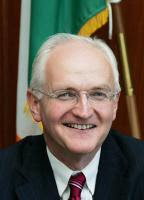 Despite Pat Kenny's best efforts to bring his interview partner to a serious statement on the Taoiseach, Bertie Ahern's unsolved financial irregularities and the revelations at the Mahon Tribunal, John Gormley (photo) weaseled out and produced once again his meanwhile only too well-known excuses. As the "line minister" who is responsible for the Mahon Tribunal in a technical and administrative sense, he pointed out that he could not comment on its procedures. Instead he urged people "to trust in the competence of Mr. Justice Mahon and his excellent team".
Despite Pat Kenny's best efforts to bring his interview partner to a serious statement on the Taoiseach, Bertie Ahern's unsolved financial irregularities and the revelations at the Mahon Tribunal, John Gormley (photo) weaseled out and produced once again his meanwhile only too well-known excuses. As the "line minister" who is responsible for the Mahon Tribunal in a technical and administrative sense, he pointed out that he could not comment on its procedures. Instead he urged people "to trust in the competence of Mr. Justice Mahon and his excellent team".